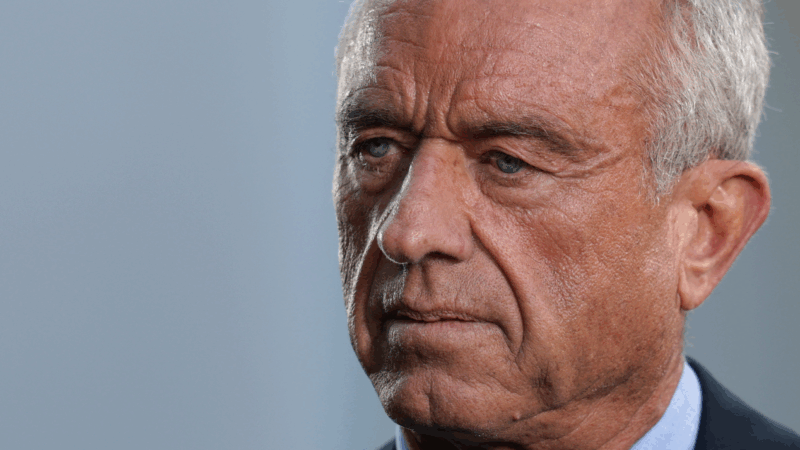Amid a growing measles outbreak, doctors worry RFK is sending the wrong message
Two people have now died in the growing measles outbreak in west Texas and New Mexico.
New Mexico Health officials on Thursday confirmed the death of an unvaccinated adult who tested positive for measles. The first death was a school-age child in Gaines County, Texas last week.
News of a second death comes as infectious disease doctors worry that the federal government’s messaging about the outbreak is putting more emphasis on treatments like vitamin A than on vaccination, even as misinformation about some of these treatments is spreading online.
Those concerns come in the wake of recent comments made by Health and Human Services Secretary Robert F. Kennedy Jr. Kennedy addressed the growing measles outbreak in an editorial for FOX News published on Sunday, also posted on the HHS website.
While mentioning the value of vaccination for community immunity, Kennedy said “the decision to vaccinate is a personal one.” He emphasized treatment for measles, saying that vitamin A can “dramatically” reduce deaths from the disease. In an interview with FOX News Tuesday, he said Texas doctors are giving steroids and cod liver oil to their measles patients and “getting very, very, good results.”
In his editorial, he said good nutrition is “a best defense against most chronic and infectious illnesses.”
That emphasis on nutrition and vitamin A to treat measles is concerning some infectious disease doctors.
“Mentions of cod liver oil and vitamins [are] just distracting people away from what the single message should be, which is to increase the vaccination rate, ” said Dr. Amesh Adalja, an infectious disease physician and senior scholar with the Johns Hopkins Center for Health Security.
While vitamin A can play a role in preventing severe disease, discussion of vitamins, “doesn’t replace the fact that measles is a preventable disease. And really, the way to deal with a measles outbreak is to vaccinate people against measles,” says Dr. Adam Ratner, a member of the infectious disease committee of the American Academy of Pediatrics.
Kennedy did acknowledge that measles is highly contagious and that it poses health risks, especially to people who are not vaccinated. He said vaccines not only protect individual children from measles, but also protect people who can’t be vaccinated. But he didn’t strongly encourage people to get their children vaccinated — which is usually a key part of the public health response during an outbreak.
In 2019, when a measles outbreak was raging in the U.S., then health secretary Alex Azar came out with a statement strongly supporting vaccination and warning of the risks of under-vaccination.
When it comes to vitamin A, studies conducted decades ago in low and middle-income countries found that the vitamin can reduce the risk of severe disease and death, in children who are malnourished and have vitamin deficiencies, says Adalja.
There’s also evidence that, even in the absence of a pre-existing deficiency, measles seems to deplete the body’s stores of vitamin A. Both the World Health Organization and the American Academy of Pediatrics recommend giving two doses of vitamin A to children who have the disease, especially if they are so sick they are hospitalized.
But, Ratner stresses that vitamin A does not prevent measles.
A false idea circulating online is that giving children high doses over long periods of time can prevent measles, says Ratner. He says that’s not only wrong but can be quite dangerous.
“Vitamin A can accumulate in the body,” he says. “It can be toxic to the liver. It can have effects that you don’t want for your child,” like liver damage, fatigue, hair loss and headaches. Ratner works as a pediatric infectious disease specialist in New York City. He says that similar misinformation about vitamin A made the rounds during the city’s measles outbreak in 2019.
Scott Weaver, director of the Institute for Human Infections and Immunity at the University of Texas Medical Branch, says he worries people might look at a vitamin bottle and think, “Well, maybe if I take two or three times this amount, I’ll be even better protected against measles.“
“I’m concerned that people think that vitamin A or other nutrition is a substitute for vaccination to prevent infection and to prevent spread,” Weaver says.
In his Fox News interview, Kennedy said Texas doctors are “getting very, very, good results.” with a mix of treatments including steroids and cod liver oil. NPR has not confirmed the use of cod liver oil in Texas, but Adalja says, “there’s no data that cod liver oil is going to have any benefit on measles.”
And because cod liver oil is so high in vitamin A, Ratner worries parents could end up giving their children too much – potentially toxic amounts.
Adalja would have liked Kennedy to emphasize that vaccines are the best defense against measles.
“Then you don’t even have to think about treatment, because when it comes to an infectious disease, prevention is always better than treatment,” he says.
Transcript:
JUANA SUMMERS, HOST:
The measles outbreak in west Texas continues to grow. There are currently 159 reported cases. Twenty-two patients have been hospitalized, and a school-aged child has died. So has an unvaccinated adult just over the border in New Mexico. Health and Human Services Secretary Robert F. Kennedy Jr. addressed the outbreak in an editorial for Fox News, and that’s now posted on the HHS website. Kennedy says the CDC has sent vaccines and treatments to Texas, but his emphasis on vitamin A as a treatment for measles worries infectious disease doctors. NPR health correspondent Maria Godoy is here with more. Hi there.
MARIA GODOY, BYLINE: Hi.
SUMMERS: Maria, tell us about the op-ed. What did Kennedy have to say?
GODOY: So he acknowledged that measles is highly contagious, that it poses health risks, especially to people who are not vaccinated. He said vaccines not only protect individual children from measles but also contribute to community immunity, which protects people who can’t be vaccinated. But he didn’t outright encourage people to get their children vaccinated, which is usually a key part of the public health response during an outbreak. He said the decision to vaccinate is a personal one. And he said good nutrition is the best defense against chronic and infectious diseases. And for measles, he said vitamin A can, quote, “dramatically reduce” deaths from the disease.
SUMMERS: Well, tell us. Can it? Can vitamin A treat measles?
GODOY: Well, so there’s some truth here. There’s evidence from studies done in low- and middle-income countries that shows that giving vitamin A to malnourished children who have measles can reduce the risk of severe disease and death. There’s less evidence in the U.S. Vitamin A deficiency isn’t common here. And thanks to vaccines, measles deaths are rare.
Now, the American Academy of Pediatrics does recommend two doses of vitamin A for children who have the disease, especially if they’re so sick they’re hospitalized. But vitamin A does not prevent measles, and there’s a lot of misinformation out there that suggests it does. Here’s Dr. Adam Ratner. He’s a member of the American Academy of Pediatrics’ Infectious Diseases Committee.
ADAM RATNER: What is circulating online now are people who are giving vitamin A at high doses over long periods of time to try to prevent children from getting measles, and that can be quite dangerous.
GODOY: You know, Ratner says vitamin A can build up in the body and can be toxic to the liver. And, you know, in another interview with Fox News, Kennedy said that doctors in Texas are getting good results from cod liver oil.
SUMMERS: Really? Cod liver oil?
GODOY: Well, that’s what Kennedy said. We have not confirmed cod liver oil is being used in the Texas outbreak. It is high in vitamin A, but doctors tell me there’s no evidence that cod liver oil can help treat measles. And because it’s so high in vitamin A, you could end up giving your child potentially toxic amounts. I spoke with Dr. Amesh Adalja with the Johns Hopkins Center for Health Security. He wanted Kennedy to emphasize vaccines to prevent measles rather than supplements to treat it.
AMESH ADALJA: I think mentions of cod liver oil and vitamin A is just distracting people away from what the single message should be, which is increase the vaccination rate, and then you don’t even have to think about treatment. Because when it comes to an infectious disease, prevention is always better than treatment.
GODOY: Other doctors I spoke with agree that the main message, especially during an outbreak, should be get vaccinated.
SUMMERS: NPR health correspondent Maria Godoy. Thank you.
GODOY: My pleasure.
Opinion: Remembering Ai, a remarkably intelligent chimpanzee
We remember Ai, a highly intelligent chimpanzee who lived at the Primate Research Institute of Kyoto University for most of her life, except the time she escaped and walked around campus.
The near death — and last-minute reprieve — of a trial for an HIV vaccine
A trial was about to launch for a vaccine that would ward off the HIV virus. It would be an incredible breakthrough. Then it looked as if it would be over before it started.
Bessemer data center developer to request rezoning for additional 900 acres
The city’s attorney informed council members of the request on Tuesday, warning that there may be media scrutiny.
Is RFK Jr.’s Administration for a Healthy America — AHA — in the works or not?
The Administration for a Healthy America is RFK Jr.'s plan to tackle chronic disease, addiction and other persistent problems. But so far it's not being set up like previous new agencies.
They quit their day jobs to bet on current events. A look inside the prediction market mania
Prediction market apps are thriving in Trump's second term, with traders betting on migrant deportations to election outcomes. A community of young, mostly male and very online traders are driving the industry's bonanza.
Major plumbing headache haunts $13 billion U.S. carrier off the coast of Venezuela
The crew of USS Ford is struggling to handle sewage problems on board the Navy's newest carrier.





